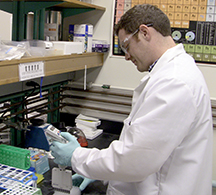Purdue technology being commercialized to test cancer drugs' benefit to individual patients
September 30, 2014
 |
|
Steve Ouellette of KinaSense works on the company's technology that could help oncologists determine faster than ever if a cancer drug works on a patient's cancer cells. KinaSense is one of more than 20 startups created in fiscal year 2014 from Purdue University innovations. (Purdue Research Foundation photo) |
WEST LAFAYETTE, Ind. - An official at a life sciences startup based on a Purdue University innovation says his company may help oncologists see faster than ever which drug therapies will benefit cancer patients and to what extent.
Steve Ouellette, co-founder and chief technology officer at KinaSense, said oncologists have no way to predict at the start of therapy which drugs will benefit a patient. An oncologist chooses an option from a group of drugs, administers it and waits to see if it works.
"It may take months or longer to see if the drug has had an effect or to see signs of resistance," he said. "If the drug does not work, the cancer may metastasize, or spread throughout the patient's body, during that time. If the drug does work but it takes that much time to detect, a tumor may relapse and grow again, but it can't be treated with the original drug anymore."
Purdue researchers have developed technology that could reduce the amount of time oncologists need to determine whether a cancer drug is working on a patient's cancer cells. The technology has been licensed exclusively to KinaSense through the Purdue Office of Technology Commercialization. More than 20 startups based on Purdue intellectual property were launched in the 2014 fiscal year. A video about KinaSense and its technology is available at http://youtu.be/igR19D_Ym7s.
Ouellette worked on the technology as a doctoral student when it was developed in the laboratory of Laurie L. Parker, then an assistant professor in Purdue's College of Pharmacy. Parker co-founded KinaSense and serves on its scientific advisory board.
KinaSense's technology works on cancer drugs that inhibit growth signals from a kinase, which is an enzyme in a cancer cell that causes the cell to grow. The technology works like a search engine by taking information about what a particular kinase looks for in a substrate, or the protein it acts upon. The technology narrows the information to a shortlist of traits, including being acted upon by only one kinase and providing the signal that the test seeks.
"An oncologist can test different drugs on a biopsy of a cancer cell, determine whether or not they work on the biopsy and to what extent," he said. "An oncologist can choose the correct drug and dosage based on that information."
The KinaSense technology also could benefit pharmaceutical companies by improving the efficiency to identify kinase-blocking compounds and moving them further into the research and development process.
Ouellette said the Purdue Office of Technology Commercialization and Purdue Foundry have helped him and his colleagues create the company and commercialize the technology.
"Through its entrepreneurial expertise, the Purdue Foundry has provided guidance and support for making decisions that move KinaSense forward. The Foundry also is an excellent place to meet and discuss problems and potential solutions with other entrepreneurs, marketing experts, attorneys and other important players that are essential to a startup company's success," he said. "The Office of Technology Commercialization also has played a critical role by helping to establish and manage the intellectual property portfolio and technology transfer from Purdue Research Foundation to KinaSense."
For information on other Purdue intellectual property ready for licensing and commercialization, visit http://www.otc-prf.org. For more information about available leadership positions, investing in a Purdue startup or licensing a Purdue innovation, visit http://www.purduefoundry.com.
About KinaSense
The KinaSense mission is to help save lives in the battle against cancer. KinaSense develops laboratory tests for identifying new cancer drugs in pre-clinical research and applies them in the clinical phases of drug discovery. We strive to be on the forefront of precision medicine by developing companion diagnostic products for personalized cancer care.
About Purdue Office of Technology Commercialization
The Purdue Office of Technology Commercialization operates one of the most comprehensive technology-transfer programs among leading research universities in the U.S. Services provided by this office support the economic development initiatives of Purdue University and benefit the university's academic activities. The office is managed by the Purdue Research Foundation, which received the 2014 Incubator Network of the Year from the National Business Incubation Association for its work in entrepreneurship. For more information about funding and investment opportunities in startups based on a Purdue innovation, contact the Purdue Foundry at foundry@prf.org.
Purdue Research Foundation contact: Steve Martin, 765-588-3342, sgmartin@prf.org
Source: Steve Ouellette, 269-870-5908, souellet@purdue.edu

